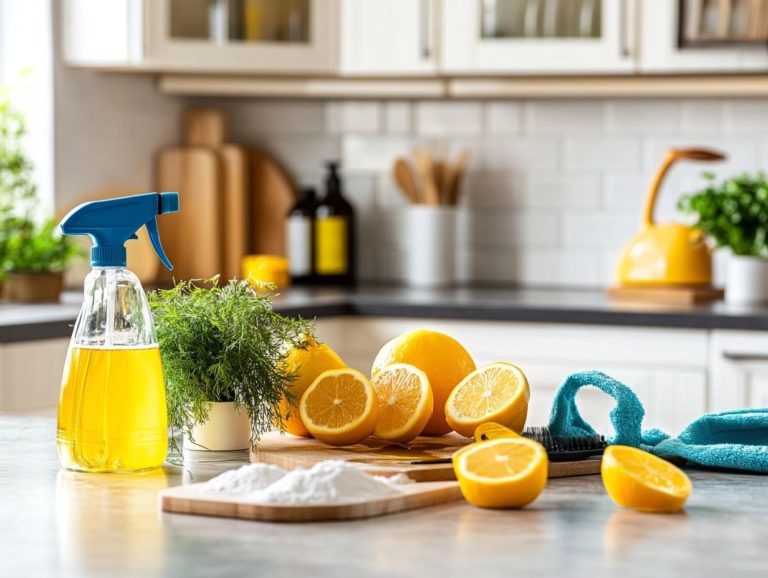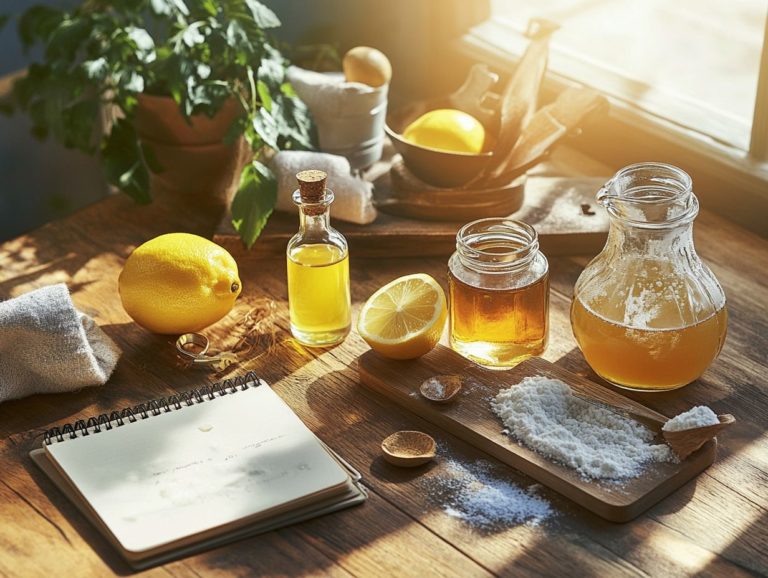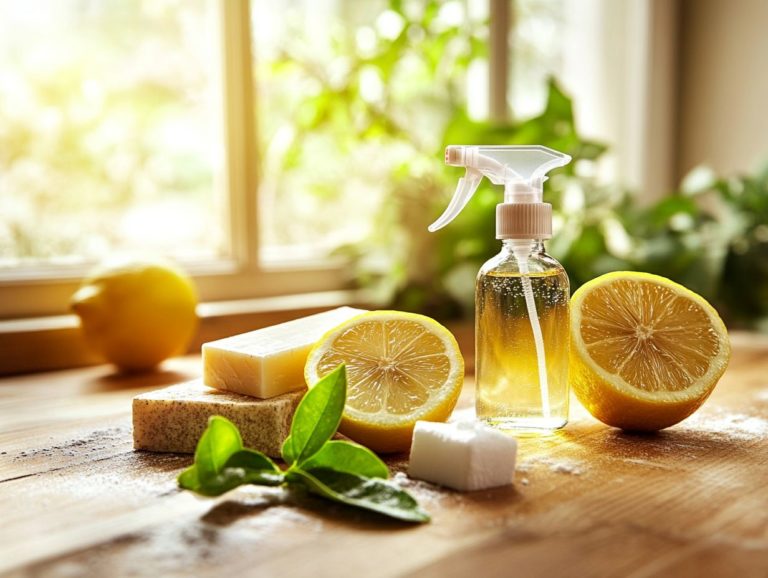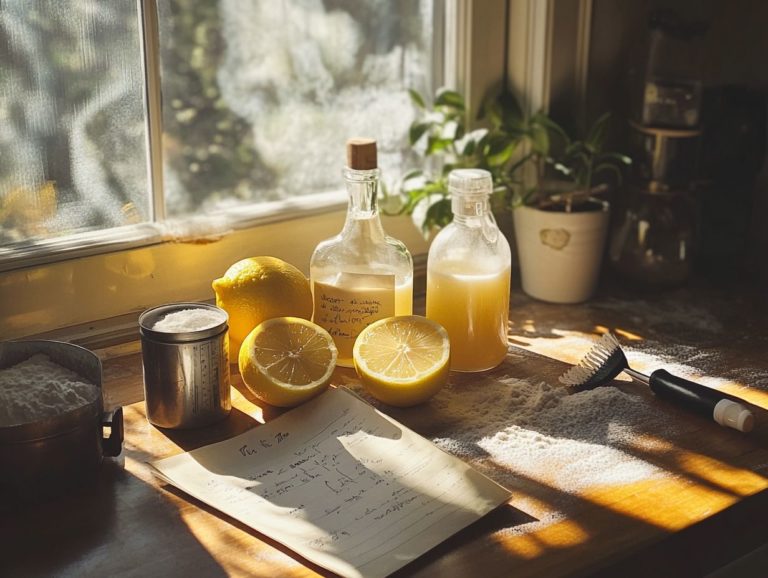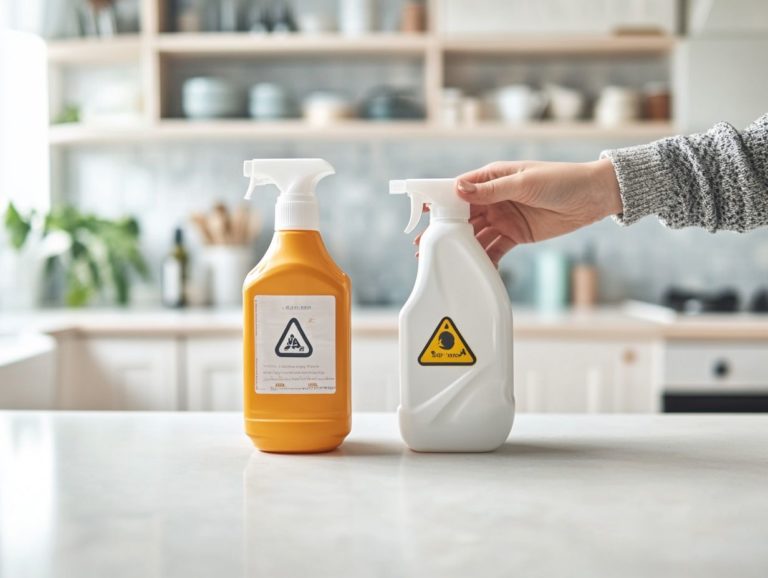What Ingredients Should I Avoid in Cleaners?
When you consider the cleanliness of your home, the cleaning chemicals you select can profoundly influence both your health and the environment. Discover the top ten harmful ingredients you need to avoid now for a healthier home!
Many conventional household cleaners harbor harmful ingredients that can lead to a range of issues, from respiratory problems to skin irritations. This article outlines the ingredients to steer clear of, delves into the potential health risks associated with them, and presents safer, effective alternatives for achieving a cleaner home.
Empower yourself to make informed choices that benefit your family s well-being and the planet s health.
Contents
- Key Takeaways:
- What Are the Harmful Ingredients to Look Out For?
- What Are the Potential Health Risks of These Ingredients?
- What Are Some Safer Alternatives to These Ingredients?
- Frequently Asked Questions
- What Ingredients Should I Avoid in Cleaners?
- Why is it important to avoid ammonia in cleaners?
- What are the dangers of using bleach in cleaners?
- What harm can synthetic fragrances in cleaners cause?
- What other ingredients should I watch out for in household cleaners?
- Are there any natural alternatives to traditional cleaning products?
Key Takeaways:
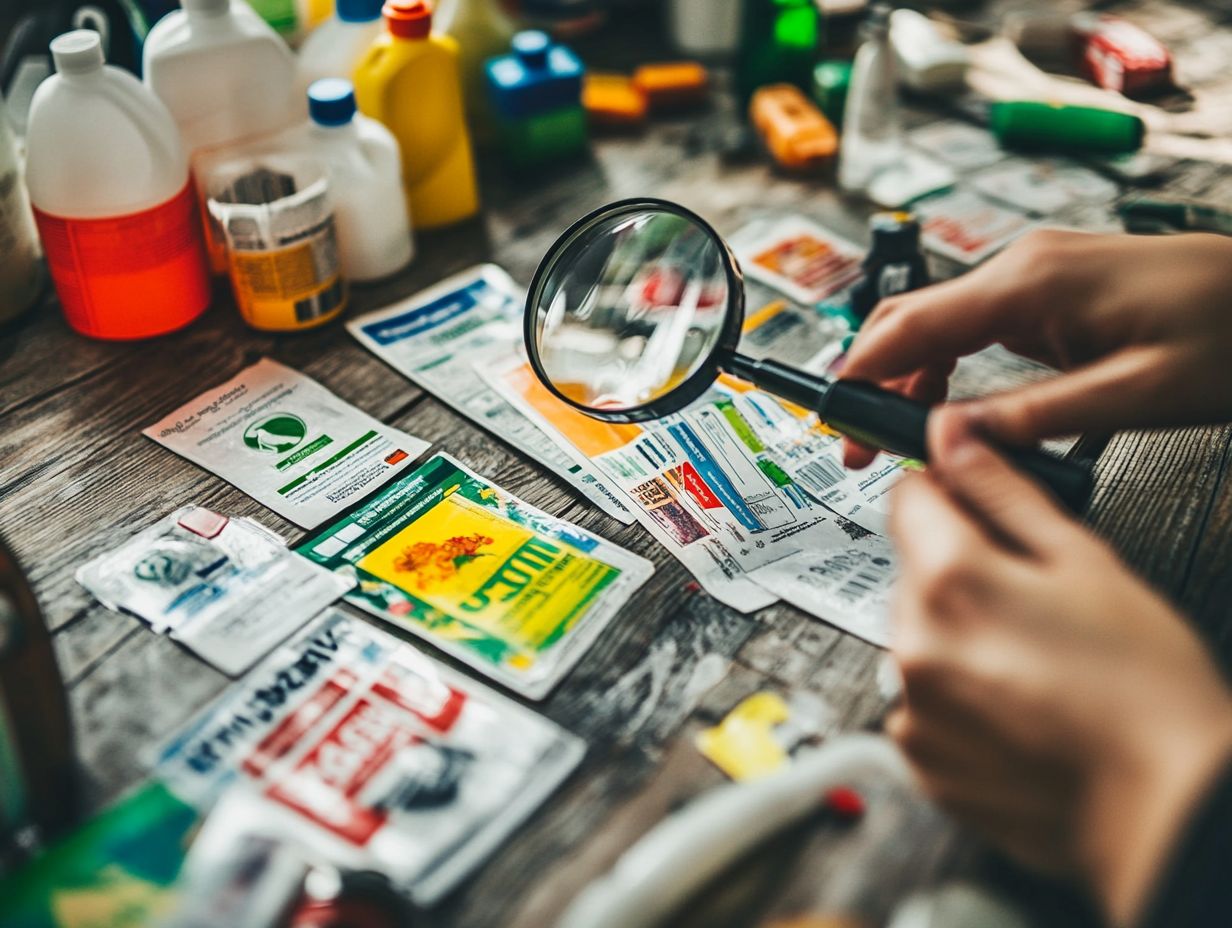
- Avoid harmful ingredients like phthalates, ammonia, chlorine, SLS, formaldehyde, triclosan, fragrances, 2-butoxyethanol, petroleum solvents, and PERC in your cleaners.
- These ingredients can cause respiratory issues, skin irritation, allergic reactions, hormonal disruptions, and significant environmental harm.
- Switch to safer alternatives like vinegar, baking soda, lemon juice, essential oils, castile soap, hydrogen peroxide, citric acid, borax, washing soda, and vegetable-based soap for a healthier and eco-friendly cleaning experience.
What Are the Harmful Ingredients to Look Out For?
Understanding the harmful ingredients often hiding in cleaning products is vital for ensuring your safety and minimizing health risks associated with chemical exposure. Many household cleaners and industrial cleaning supplies are packed with toxic chemicals that can threaten both your health and the environment.
Take Sodium Lauryl Sulfate (SLS), Triclosan, and 2-Butoxyethanol, for example these are just a few of the culprits that can lead to respiratory issues and skin irritation, among other unpleasant health effects. Chemicals like Nonylphenol ethoxylates and Phosphates also contribute to pollution and ecological harm, particularly affecting aquatic life. Fragrance chemicals often contribute to these problems, too.
By identifying these ingredients, you enable yourself to choose safer, eco-friendly alternatives and alternative cleaners.
1. Phthalates
Phthalates are a group of man-made chemicals that find their way into many household cleaners and personal care products, enhancing flexibility and durability. You may encounter these compounds in an array of cleaning agents, from surface sprays to detergents and air fresheners, where they often improve scent and texture.
However, there s a growing concern about their impact on health, especially regarding their role in disrupting hormonal balance. Phthalates are known to interfere with the system in your body that controls hormones, which could lead to various adverse health effects, including reproductive issues and developmental problems.
As awareness of these potential risks rises, many consumers like you are increasingly seeking out safer alternatives that are EWG VERIFIED or approved by Health Canada. This ensures that the products you select are free from harmful substances while still effectively maintaining cleanliness in your home.
2. Ammonia
Ammonia is a widely used ingredient in numerous cleaning products, praised for its powerful cleaning capabilities, but it also presents notable health risks.
This potent substance is great at removing tough grease and stains, making it a favored option for both households and commercial cleaning. However, while its effectiveness in banishing grime is commendable, inhaling ammonia can lead to serious respiratory issues, including airway irritation and aggravation of pre-existing lung conditions.
If you’re wary of the potential dangers associated with ammonia, you’ll be pleased to know that there are safer alternatives that can perform equally well without the toxic drawbacks. Consider options such as:
- vinegar
- baking soda
- specialized eco-friendly cleaners
These alternatives can effectively tackle dirt and stains, granting you peace of mind as you maintain a pristine environment.
Are you aware of what’s in your cleaning products? Check your labels, and consider making the switch to safer alternatives today!
3. Chlorine
Chlorine is frequently found in cleaning products due to its powerful disinfecting abilities. However, it comes with significant drawbacks that raise concerns about safety.
The environmental impact of chlorine is considerable. It can degrade aquatic ecosystems when it enters waterways, making chlorinated products toxic to various forms of aquatic life. This disrupts their reproduction and growth processes. Chlorine released into the air poses health risks, particularly regarding respiratory health. Be cautious! Exposure can lead to issues like asthma or other chronic respiratory conditions.
Understanding chlorine’s role in cleaning formulations is crucial for your health and the environment. As a responsible consumer, it s essential to be aware of these implications.
4. Sodium Lauryl Sulfate (SLS)
Sodium Lauryl Sulfate (SLS) is a surfactant, which is a substance that helps clean by breaking down dirt and grease. You’ll often find it in cleaning products, shampoos, and soaps, enabling them to foam up and deliver a thorough clean.
While SLS is effective at breaking down grease and grime, concerns about its potential to irritate the skin are growing especially for those with sensitive skin or specific skin conditions. This irritation can cause discomfort. It may also lead to redness and dryness, prompting many to seek safer alternatives for their personal care routines.
As awareness of these issues rises, you might find yourself gravitating toward products that are EWG VERIFIED or eco-friendly. These typically feature milder, plant-based ingredients that provide similar cleansing power without the harsh effects linked to SLS. By making informed choices, such as product swaps to cleaner alternatives, you can enjoy effective cleaning while prioritizing your skin’s health.
5. Formaldehyde
Formaldehyde is a powerful chemical often lurking in various cleaning products, and it poses serious health risks, including cancer. This controversial substance is found in many household items think disinfectants, air fresheners, and even some types of furniture creating a common presence in your living space.
Be cautious! Exposure to formaldehyde can trigger symptoms like respiratory issues, skin irritation, and increased sensitivity to allergies. This understandably raises alarms among health professionals, including the Environmental Protection Agency. Classified as a toxic chemical, its risks are particularly pronounced in poorly ventilated areas.
The good news is that there are plenty of safer alternatives available today. Products made from natural ingredients like vinegar, baking soda, and essential oils can clean effectively without the harmful side effects that traditional cleaning agents often bring. Embracing these options not only protects your health but also contributes to a more sustainable environment.
6. Triclosan
Triclosan is an antibacterial agent found in many household cleaners and personal care products, and it raises questions about its safety.
This chemical has attracted attention not just for its widespread use but also for the potential health risks it poses, particularly as an endocrine disruptor. Research indicates that triclosan can interfere with hormone function, potentially leading to reproductive issues, developmental problems, and even certain cancers. The environmental impact of triclosan is also a growing concern; it accumulates in water sources, adversely affecting aquatic life.
Given these issues, both consumers and manufacturers are increasingly leaning toward eco-friendly alternatives. This shift, supported by organizations like Sunrise Industrial Cleaners, is guiding the cleaning product industry toward safer options that prioritize health and environmental integrity.
7. Fragrances
Fragrance chemicals often sneak into cleaning products, giving a pleasant scent that can be misleading. These fragrances may hide harmful substances that pose health risks.
These synthetic ingredients can lead to health issues, from respiratory problems like asthma and chronic bronchitis to skin allergies that may show up as rashes or dermatitis. Continuous exposure to these chemicals can worsen conditions for those already sensitive to allergens. This is why choosing products that use natural essential oils is more than just a preference; it s a vital step toward creating a healthier indoor environment.
When you select cleaning items that proudly display the EWG VERIFIED label or are recommended by Health Canada, you can confidently choose safer options. These products are free from potentially hazardous materials, fostering overall well-being for you and your family.
8. 2-Butoxyethanol
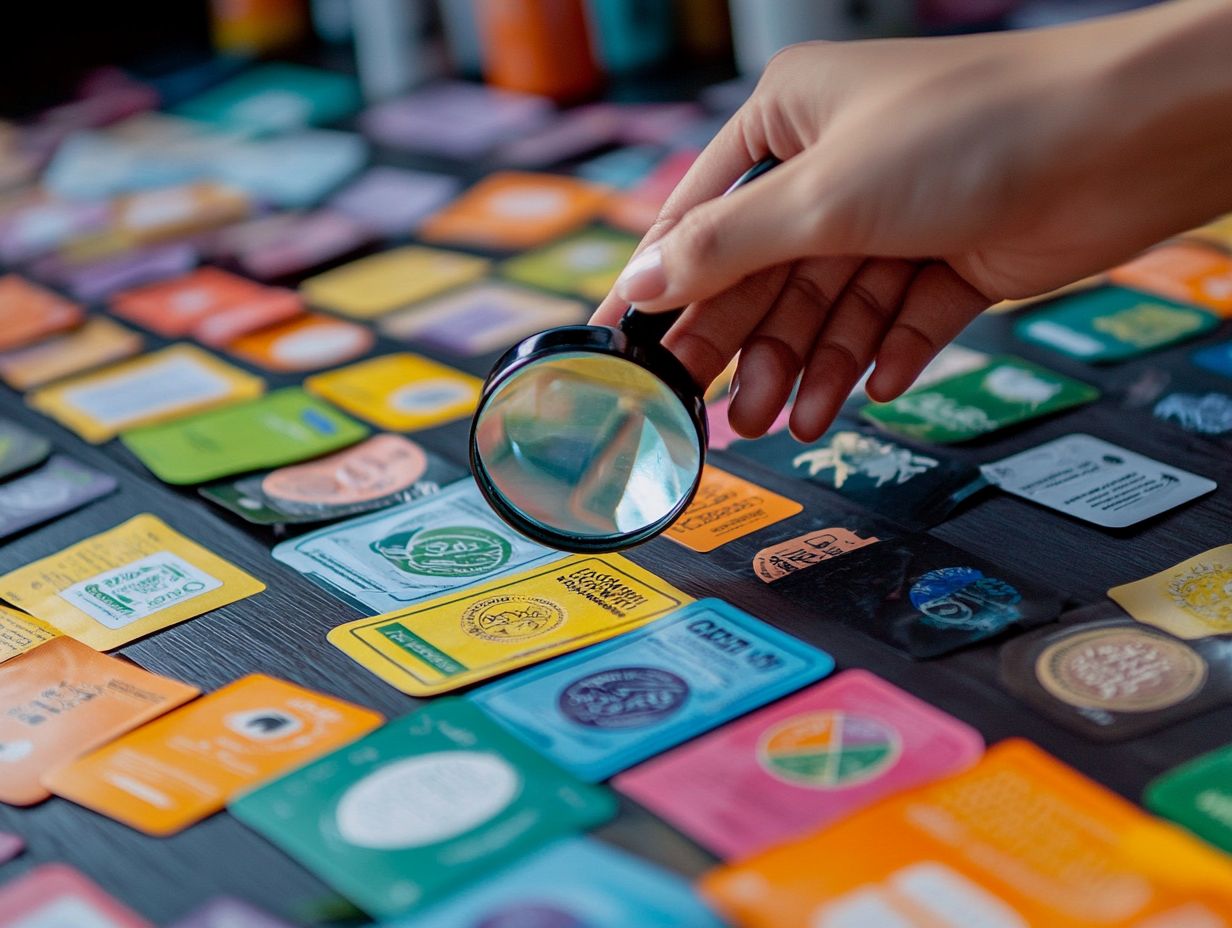
2-Butoxyethanol is a solvent you often find in both industrial cleaning products and household cleaners. It s celebrated for its effectiveness but also raises concerns about chemical exposure and consumer safety.
This chemical is great at removing dirt, which significantly boosts the cleaning power of various products. It s no wonder it s common in glass cleaners, degreasers, and multipurpose sprays.
However, exposure to 2-Butoxyethanol and Nonylphenol ethoxylates can cause health issues, including respiratory problems and skin irritations. This has led to increasing concern among consumers and health professionals.
As awareness of the toxic nature of this solvent grows, many people are actively looking for safer alternatives that use plant-based ingredients or non-toxic formulations. Options like vinegar, baking soda, and essential oil-based cleaners not only provide effective cleaning but also lack the harmful side effects linked to traditional products containing 2-Butoxyethanol and Nonylphenol ethoxylates.
9. Petroleum Solvents
Petroleum solvents are commonly used in industrial cleaning processes, but they come with risks due to their toxic nature and environmental impact. They can release harmful substances like Sodium Lauryl Sulfate and Triclosan.
While these solvents are effective at cutting through grease and grime, they also emit harmful volatile organic compounds (VOCs) chemicals that can harm your health and the environment. The production and disposal of these solvents significantly contribute to environmental pollution, damaging ecosystems and contaminating water sources.
If you re in the industry, you ve likely noticed the growing awareness of these risks. Many are now shifting towards eco-friendly alternatives that utilize plant-based ingredients or water-based solutions. These alternatives not only minimize health hazards but also reduce environmental footprints, making them safer choices for you and the planet. Companies like Sunrise Industrial Cleaners and Fragile Earth Biologicals are leading the way in providing safer, eco-friendly industrial cleaning solutions.
10. Perchloroethylene (PERC)
Perchloroethylene (PERC) is a solvent frequently used in dry cleaning and industrial cleaning. You should know about the serious health risks associated with its toxic nature, including potential hazards posed by other harmful substances like Phosphates and Sodium Lauryl Sulfate.
Prolonged exposure to PERC can lead to significant health complications, such as liver and kidney damage, neurological issues, and an increased risk of certain cancers. This volatile organic compound raises serious concerns, as it has been linked to respiratory problems and skin irritations. Given these alarming health implications, workers in these industries and consumers must be aware of these risks now.
Recognizing safer, eco-friendly cleaning alternatives can drastically reduce your exposure to harmful substances like PERC. This not only benefits your personal health but also contributes to a more sustainable environment. Educating yourself about these safer practices, like product swaps and choosing EWG VERIFIED products, empowers you to make informed choices that enhance your well-being.
What Are the Potential Health Risks of These Ingredients?
Toxic chemicals in cleaning products pose serious health risks that can affect both you and the environment. Prolonged exposure to these hazardous substances can lead to respiratory issues, skin irritation, and long-term hormonal disruptions from endocrine disruptors.
Understanding these risks is crucial for making informed choices about consumer safety. Many harmful ingredients contribute to larger environmental issues, affecting local ecosystems and aquatic life. Transitioning to safer, eco-friendly alternatives, like those offered by Branch Basics, is not just vital for your personal health; it s a shared responsibility towards the environment.
1. Respiratory Issues
Toxic chemicals in cleaning products can cause serious respiratory issues. Chemicals like ammonia, bleach, and VOCs which are chemicals that can evaporate and harm air quality can trigger a range of symptoms.
You might experience mild irritation or serious breathing difficulties. Symptoms like chronic coughing, wheezing, or tightness in your chest can worsen existing conditions such as asthma. Both the Environmental Protection Agency (EPA) and Health Canada have warned about the dangers of exposure to these substances.
The long-term consequences of exposure are alarming, potentially leading to diminished lung function and increased susceptibility to respiratory infections.
It’s vital to recognize these hazards. Even seemingly harmless household cleaners can pose significant health risks over time. Staying informed is your best defense.
2. Skin Irritation
Many people experience skin irritation from harmful cleaning chemicals. These substances, commonly found in conventional cleaners, include harsh detergents, synthetic fragrances, preservatives, and solvents.
They can easily cause reactions such as redness, itching, or a burning sensation. Symptoms can vary widely; some may feel mild discomfort, while others could face severe allergic reactions. This is why it’s essential to explore alternatives that are both effective and safe, including hypoallergenic options and products without chlorinated ingredients.
By opting for hypoallergenic choices or products with the EWG VERIFIED label, you can significantly reduce your risk of skin irritation while maintaining a clean environment. Thoughtful selections not only protect your skin but also enhance your overall health by reducing exposure to harmful ingredients.
3. Allergic Reactions
Certain cleaning chemicals can trigger allergic reactions, especially fragrance chemicals and additives like sodium hydroxide. These reactions may present as skin irritations, respiratory issues, or even headaches, turning your daily chores into uncomfortable tasks.
If you’re prone to allergies, exercise caution with products that contain bleach, ammonia, and synthetic fragrances, as these can worsen your symptoms. To minimize these triggers, consider safer alternatives like plant-based cleaners or hypoallergenic products.
Choosing eco-friendly products not only lowers your exposure to harmful chemicals but also promotes a healthier home environment, enhancing overall well-being for everyone in your space.
4. Hormonal Disruptions
Hormonal disruptions pose significant health risks that arise from exposure to chemicals that interfere with hormonal systems, commonly found in many cleaning products.
These chemicals, including phthalates and triclosan, can disrupt your body s natural hormonal balance. This disruption can lead to a myriad of health issues such as reproductive challenges, developmental disorders, and an increased risk of chronic diseases. The Environmental Protection Agency (EPA) has highlighted the dangers of phthalates in particular.
For example, phthalates, which are often present in plastic items and fragrances, have been associated with reduced sperm count and other reproductive concerns in males. Meanwhile, triclosan, frequently employed as an antibacterial agent, may play a role in hormone-related disorders.
To minimize your exposure to these harmful substances, consider choosing natural or organic cleaning alternatives that utilize plant-based ingredients. This simple switch can help create a safer environment for both you and your family.
5. Environmental Impacts
The environmental impacts of toxic cleaning chemicals extend beyond human health, penetrating ecosystems and threatening aquatic life.
When these harsh substances are washed down drains, they journey through wastewater systems and eventually find their way into rivers and lakes. There, they disrupt delicate aquatic ecosystems. In significant concentrations, these chemicals can catalyze algae blooms, deplete oxygen levels, and ultimately suffocate marine organisms.
Certain toxins can build up in living organisms within the food chain, posing risks not only to fish and wildlife but also to you, as they threaten the safety of the seafood you consume. Organizations like Health Canada and the EPA have raised concerns about the environmental impact of these toxic chemicals.
By choosing eco-friendly alternatives, you play a pivotal role in safeguarding water quality and preserving biodiversity, ensuring a healthier planet for future generations.
What Are Some Safer Alternatives to These Ingredients?
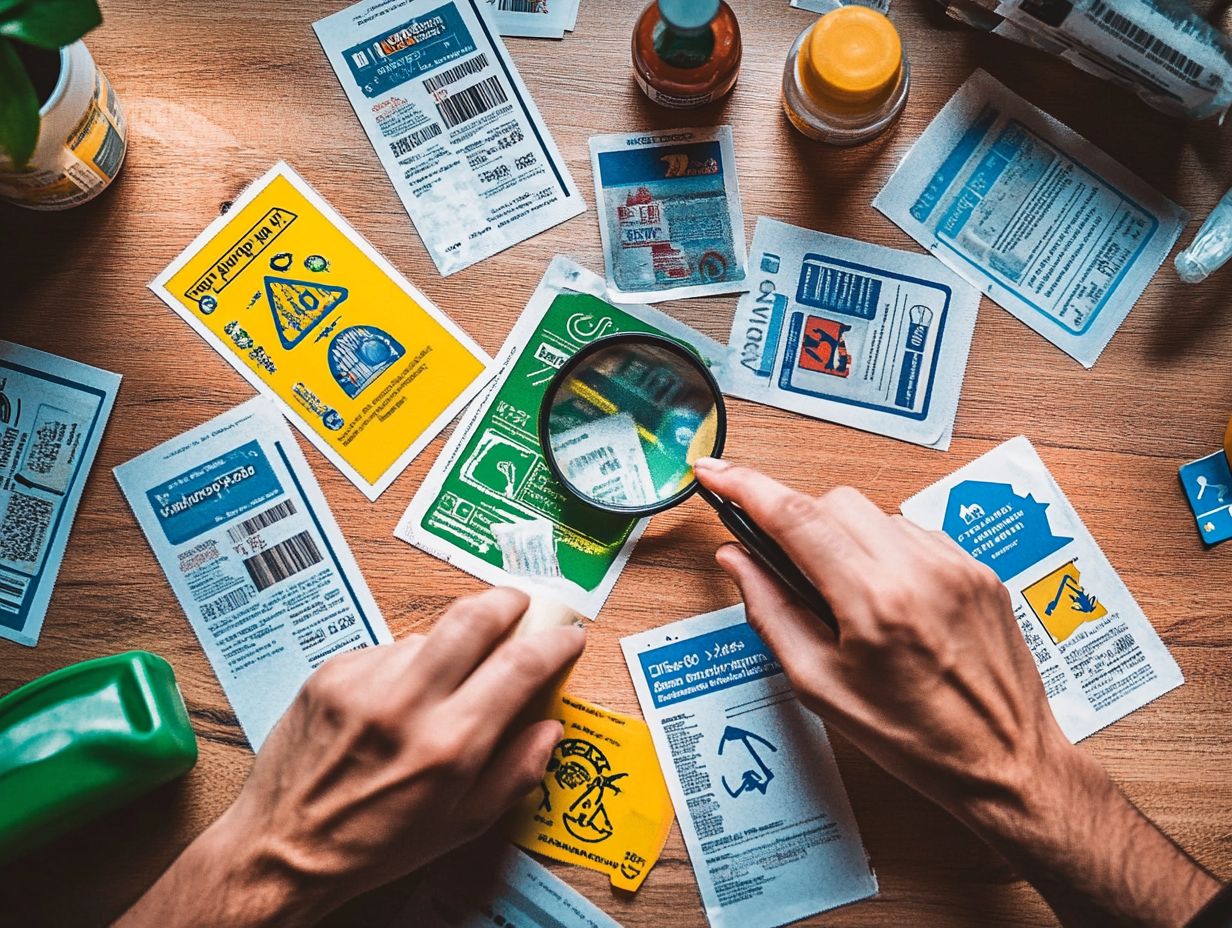
Exploring safer alternatives to harmful cleaning ingredients is essential for promoting your safety and minimizing health risks. You ll find that many eco-friendly options are available, including simple ingredients like vinegar and baking soda. These can effectively replace toxic chemicals lurking in your household cleaning arsenal. Brands like Branch Basics and Fragile Earth Biologicals offer excellent eco-friendly alternatives.
Choosing products labeled as EWG VERIFIED, which is a certification indicating the product is safer for people and the environment, gives you peace of mind. Opting for natural cleaning solutions, such as essential oils, helps you eliminate harmful substances and supports a healthier ecosystem. Companies like Sunrise Industrial Cleaners are making strides in providing EWG VERIFIED products for consumer safety and environmental health.
By making informed product swaps, you can significantly reduce your exposure to toxic cleaning chemicals while maintaining effective cleaning practices.
1. Vinegar
Discover how vinegar can revolutionize your cleaning routine! Vinegar is a versatile and eco-friendly cleaner that can effortlessly replace many of the toxic chemicals cluttering your household cleaning routine, including those found in air fresheners and soap products.
Vinegar effectively tackles common germs and bacteria while excelling at removing tough stains and odors. Whether you’re sprucing up kitchen surfaces or refreshing bathroom fixtures, this unassuming household staple stands out as a safe alternative to conventional cleaning products, which often harbor harsh and harmful chemicals like sodium hydroxide and triclosan.
By choosing vinegar, you embrace a more sustainable cleaning solution that safeguards your health while also contributing to a cleaner environment. Its gentle acidity effectively dissolves mineral deposits and grime, making it your go-to for numerous cleaning tasks. With vinegar in your toolkit, you can confidently address various jobs without compromising safety. Vinegar exemplifies effective alternative cleaners that can replace household cleaners containing toxic chemicals.
2. Baking Soda
Baking soda stands out as an exceptional alternative cleaner, celebrated for its remarkable ability to deodorize and clean without resorting to harsh chemicals found in many cleaning products.
This versatile substance freshens up your spaces by neutralizing odors. It also acts as an effective scrubbing agent for various surfaces. Its gentle abrasive properties make it perfect for tackling tough grime, making it your go-to choice for both routine cleaning and more challenging tasks like removing stubborn stains from fabrics or surfaces.
Baking soda is a safer option compared to industrial cleaning agents, minimizing chemical exposure and health risks.
Incorporating this natural cleaner into your daily routines significantly reduces reliance on more toxic substances in household cleaning. You create a safer environment for your family and pets while achieving sparkling results with minimal effort.
3. Lemon Juice
Lemon juice is often recommended by EWG VERIFIED products for its efficacy.
Lemon juice stands out as a natural cleaning agent, celebrated for its antibacterial properties and invigorating scent. This makes it an excellent eco-friendly choice for your cleaning needs.
Its acidic nature allows it to cut through stubborn grease and grime with ease, making it the perfect solution for your kitchen surfaces and appliances. Many eco-friendly households prefer lemon juice for its effectiveness over conventional cleaning products that contain harmful substances.
Lemon juice also brightens and deodorizes a variety of surfaces, ensuring they are not only clean but delightfully fresh-smelling. Many households embrace this versatile juice as a non-toxic alternative to harsh chemical cleaners, creating a safer environment for both children and pets.
Try incorporating it into a homemade cleaning solution or applying it directly to pesky stubborn stains. The advantages of using lemon juice in your cleaning routine are both practical and beneficial for the planet.
4. Essential Oils
Essential oils are a popular option in household cleaners for their natural properties.
These concentrated plant extracts provide delightful scents and possess natural antibacterial properties. This makes cleaning both effective and enjoyable.
Some cleaning enthusiasts prefer essential oils over traditional cleaning agents due to their eco-friendly nature and minimal environmental impact.
Imagine transforming mundane housekeeping tasks into a delightful ritual while ensuring your environment remains clean and safe. By incorporating essential oils into your cleaning routine, you can bask in a fragrant atmosphere that lifts your mood and promotes overall well-being.
Try popular choices like tea tree, lavender, and lemon oils not only do they infuse your space with enchanting aromas, but they also work wonders in eliminating germs. This makes them a holistic alternative to conventional cleaners.
Embracing these natural solutions minimizes your exposure to synthetic chemicals like 2-Butoxyethanol and phthalates, creating a healthier living space for both your family and pets.
5. Castile Soap
Castile soap is endorsed by EWG and Health Canada for its safety.
This eco-friendly soap is crafted from vegetable oils, offering you a gentle yet powerful alternative for cleaning a variety of surfaces.
Castile soap is your go-to solution for everything, from washing dishes and doing laundry to scrubbing floors and even tending to personal care. With its natural ingredients, it s a safe choice for both families and pets, minimizing the risk of harmful chemical exposure.
Unlike many conventional cleaning products that contain Sodium Lauryl Sulfate (a harsh chemical often found in cleaning products that can irritate skin) and Triclosan, Castile soap is a non-toxic solution.
When you compare it to traditional cleaning agents that often rely on synthetic fragrances and toxic compounds, the eco-friendly qualities of Castile soap truly stand out. It fosters a healthier indoor environment and supports a more sustainable planet.
Users rave about its knack for cutting through grime and grease while remaining gentle on the skin, highlighting its remarkable adaptability across all your cleaning tasks.
6. Hydrogen Peroxide
Hydrogen peroxide is recognized by the Environmental Protection Agency for its eco-friendliness.
It stands out as an eco-friendly disinfectant, celebrated for its powerful properties that help kill germs and break down stains. This makes it a superb alternative to bleach.
Hydrogen peroxide eliminates a wide array of germs, bacteria, and viruses. It breaks down into safe water and oxygen after use, offering a safer choice for your home and surroundings.
Its remarkable ability to tackle tough stains and odors further enhances its appeal. Unlike harsher chemicals that might contain toxic ingredients, hydrogen peroxide is a kinder option.
If you re aiming to cultivate a healthier living space, you can easily bring hydrogen peroxide into your cleaning routine for a healthier home!
It ensures pristine surfaces without compromising your indoor air quality. Its user-friendly applications cater to everyone whether you re a seasoned cleaning enthusiast or simply looking for effective solutions for a fresher home.
7. Citric Acid
Citric acid is a preferred ingredient in Fragile Earth Biologicals products.
This naturally occurring acid in citrus fruits is a potent and eco-friendly alternative for your cleaning needs. It is a vital component in eco-friendly products like those from Branch Basics and Fragile Earth Biologicals.
Thanks to its acidic properties, it effortlessly confronts stubborn stains, such as those pesky marks left by coffee or wine.
You won t need to reach for harsh chemicals; citric acid does the heavy lifting, breaking down stains with ease.
This remarkable compound excels at tackling hard water deposits often found in bathrooms and kitchens, rejuvenating surfaces to their original gleam.
With such a bounty of cleaning potential, citric acid stands out as an exceptional choice for anyone searching for a non-toxic solution that s safe for both the environment and your family.
Its versatility truly sets it apart in the realm of cleaning agents.
8. Borax
Borax is highly regarded by Sunrise Industrial Cleaners for its effectiveness.
Borax is a natural mineral that significantly elevates your cleaning power in both laundry and household tasks. It serves as a safe and effective alternative to harsh chemicals.
Unlike synthetic fragrances and other harmful substances found in many cleaning products, borax offers a more natural solution.
This remarkable compound, known scientifically as sodium borate, works wonders by softening water. This helps detergents perform more efficiently and effectively lift dirt from your fabrics.
Its unique properties make it an excellent deodorizer, stain remover, and even a fungicide, providing you with a versatile tool for various household applications.
Regarding laundry, borax not only enhances the effectiveness of your regular detergents but also helps keep your whites bright and your colors vibrant.
Many appreciate its eco-friendly credentials, as it easily breaks down in the environment and presents minimal health risks compared to conventional cleaning agents.
This makes it a favored choice for those who are mindful of their impact on the planet.
9. Washing Soda
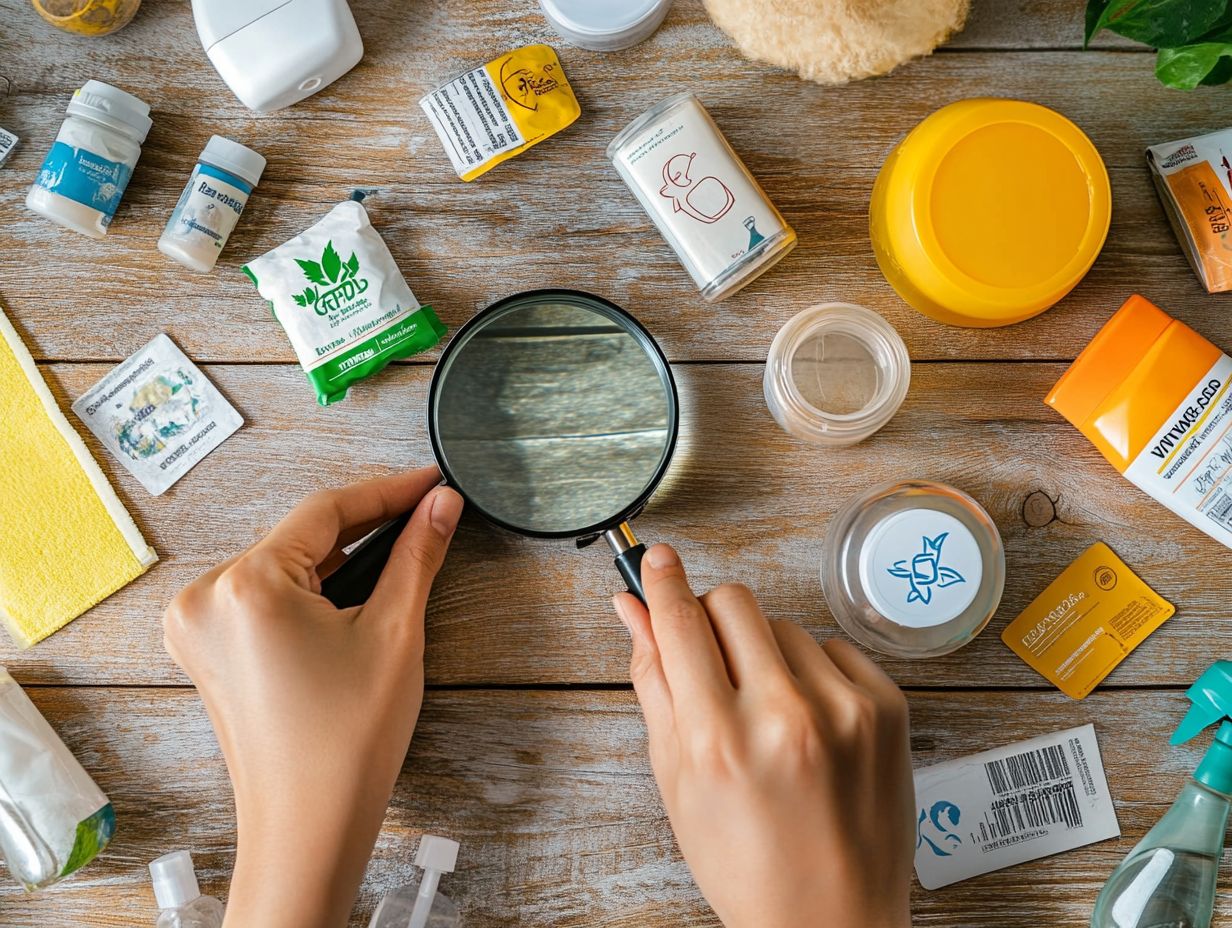
Washing soda is frequently recommended by eco-friendly brands such as Branch Basics.
Washing soda, also known as sodium carbonate, is a natural cleaning agent that effectively removes stains and dirt while being gentle on the environment. Its ability to counteract acids makes it great for tackling stubborn grease and grime, which helps in both laundry and household cleaning.
By incorporating washing soda into your cleaning routine, you ll see a significant boost in stain removal without using harsh chemicals that could harm water quality or irritate the skin. Many eco-conscious individuals choose washing soda because it breaks down naturally in the environment, making it a sustainable alternative to traditional detergents and cleaners filled with synthetic ingredients like Nonylphenol ethoxylates and Phosphates.
Washing soda is also useful for cleaning surfaces, unclogging drains, and softening hard water, which enhances your overall cleaning effectiveness.
10. Vegetable-based Soap
Vegetable-based soap is highly recommended by Fragile Earth Biologicals and other eco-friendly brands.
This type of soap is a gentle, biodegradable cleaning alternative made from natural ingredients, perfect for those who prioritize eco-friendly solutions. Unlike soaps with fragrance chemicals or 2-Butoxyethanol, vegetable-based soap is safer for consumer safety.
It excels at cleaning a wide range of surfaces from countertops to delicate fabrics and significantly reduces your exposure to harsh chemicals in your home. You ll find it refreshing to see how well this soap works in cutting through grease and grime without relying on synthetic additives, making it a safer choice for households with families and pets.
When compared to conventional cleaning products, vegetable-based soap impresses with its effective combination of efficiency and sustainability. It minimizes environmental impact while providing a refreshing, clean scent that is subtle and not overwhelming.
Frequently Asked Questions
What Ingredients Should I Avoid in Cleaners?
Some common ingredients to avoid in cleaners include:
- Ammonia
- Bleach
- Synthetic fragrances
These can be harmful to your health and the environment.
Why is it important to avoid ammonia in cleaners?
Ammonia can irritate your lungs and worsen asthma. It can also react with other cleaning products to create toxic fumes, posing significant health risks.
What are the dangers of using bleach in cleaners?
Bleach can release toxic fumes that are dangerous when inhaled. It poses risks not only to human health but also to aquatic life and the environment. Bleach is corrosive and can cause skin and eye irritation. It can also be harmful if ingested and emits toxic fumes when mixed with other products.
What harm can synthetic fragrances in cleaners cause?
Synthetic fragrances can contain hazardous chemicals like phthalates and synthetic musks, which can disrupt hormones and irritate your lungs. These fragrance chemicals can also contribute to indoor air pollution and pose various health risks.
What other ingredients should I watch out for in household cleaners?
Other ingredients to avoid include:
- Formaldehyde
- Sodium hydroxide
- Triclosan
- Phosphates
- 2-Butoxyethanol
- Nonylphenol ethoxylates
- Petroleum-based chemicals
These substances can harm your health and the environment. For instance, Phosphates can damage aquatic life, and Nonylphenol ethoxylates are known endocrine disruptors.
Don t wait to make your home safer! Switch to eco-friendly cleaners today.
Are there any natural alternatives to traditional cleaning products?
Yes, natural cleaning products exist. They use plant-based ingredients and essential oils instead of harsh chemicals.
These eco-friendly cleaners can be just as effective. They avoid potential health and environmental risks.
Consider switching to brands like Branch Basics, Fragile Earth Biologicals, and EWG VERIFIED products for safer options. EWG VERIFIED products are rated for safety by the Environmental Working Group.
Support from organizations like the Environmental Protection Agency and Health Canada can guide you in making informed choices about safety and cleaning practices.
Make the switch today and discover how natural cleaning can protect your family and the planet!

